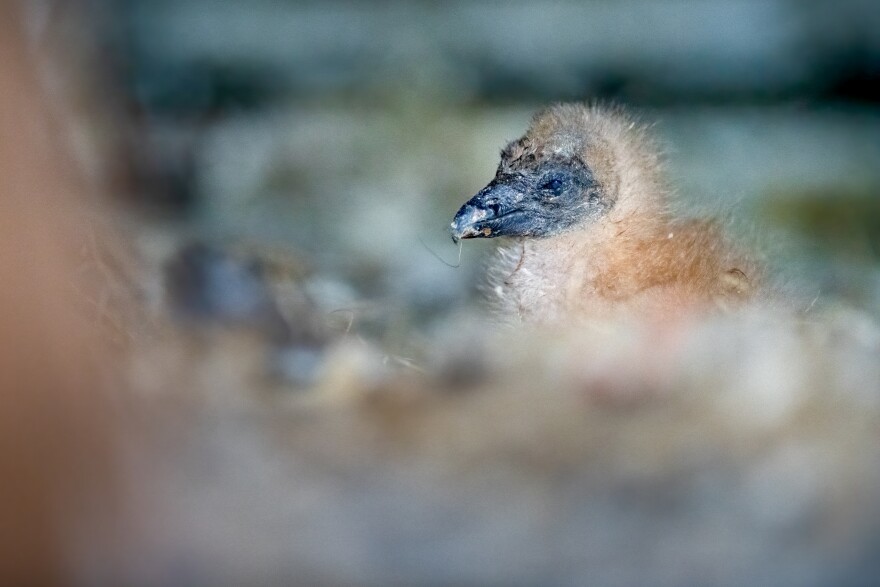In mid-May two years ago, Cynthia Crowley got a call from her landlord telling her that part of the falling-down barn behind her home in Burlington’s Old North End would soon be demolished after years of neglect.
“I was like, 'You can’t,'” she said. “Or at least, 'Can you put it off a few months?' Because the first pair of black vultures known to be breeding in Vermont is breeding in this barn.”
In the early weeks of the pandemic, working from home, she spotted the birds in her backyard. She watched as they mated, perched on the roof of the barn and took shifts guarding their egg.
Crowley has been paying attention to birds since she was a college student studying ecology.
“It made me realize how much of the world I wasn't noticing as I was moving through it,” she said.
She recognized the vultures from when she lived in Louisiana, where they’re common. But she had never seen them in Vermont.
“I thought it was an oversight on my part,” she said. “Like wow, I can’t believe I haven’t seen these here before. But clearly they’re common enough that they just show up in the backyard.”


After consulting with other birders, though, she realized that was not the case: Black vultures live in the southeast and throughout central and South America. This was the first time anybody had seen breeding behavior in Vermont.
“What they represent really is the sort of front edge of an expanding population,” said Neil Buckley, a biologist at SUNY Plattsburgh who lives in Vermont.
While most birds are facing rapid population declines across the continent, these vultures have been steadily gaining ground along the East Coast. Nesting pairs were spotted in New York and Massachusetts in the ‘90s, then in Connecticut and Rhode Island more recently.
That might be as roadkill becomes more plentiful — a major food source — and as winters warm, Buckley explains.
“What they represent really is the sort of front edge of an expanding population.”Neil Buckley, SUNY Plattsburgh
He’s been studying the species for decades.
“Most people consider black vultures and the turkey vultures, which are very common in Vermont, to be not the most handsome bird you’ll ever see, frankly,” Buckley said. “But I really like them. I always have. Maybe that says something more about me than it does about the average person.”
He likes their bald heads that look like a hood of chain mail. And that they’re smart and adaptable, with intricate social lives. They can live for over 20 years, cooperate to find food and mate for life.
They also have this clever trick to cool down.
“Basically they poop on their feet,” Buckley said. “As that liquid evaporates it carries heat away.”

The birds aren’t on the federal or state endangered species lists, but when Buckley first heard about the pair in Crowley’s backyard, in the middle of Burlington, he figured they’d be protected by federal legislation called the Migratory Bird Treaty Act. It’s a 100-year-old law that safeguards most birds in the country.
But how the law is interpreted changed in 2017, to become narrower in scope — and the new guidelines were less clear-cut.
After Crowley spoke with her landlord, she called the Vermont Fish and Wildlife Department, but officials said there was nothing they could do. (Later, the department acknowledged the law could have protected the vultures in this case.)
The night before the demolition, just a few days after the chick was born, Crowley tried talking to the contractor.
"I said, ‘There’s a family in there of birds. They're going to be disturbed, if not destroyed, by this activity, just so you know.’ And he was kind of like, ‘We won’t hurt them,'" she said.
So the next day, Crowley stood in her backyard as a skid-loader ripped off half the barn. While part of the structure was knocked down, the baby vulture survived.
Afterwards, with a big hole in the side of the barn, Crowley could easily see into the top floor of the structure. That summer she would park her car in the next-door neighbor’s driveway, climb up on the roof and peer through her binoculars to keep tabs on the baby bird.


“We watched it go from being stuck in its one spot and getting bigger and bigger, to being able to fly around inside the barn,” she said. “That was awesome.”
The birds have not come back to nest in the barn. But there have been dozens of sightings of groups of black vultures across the state in the two years since then — from Brattleboro to Colchester and Wells. (And some researchers are looking to find another breeding pair in the state.)
Crowley has seen a pair flying over Burlington several times this spring.
“I can't tell if they're the exact same ones,” she said. “I suspect they might be part of the same community, if not the same individuals.”
Lexi Krupp is a corps member for Report for America, a nonprofit national service program that places journalists in local newsrooms to report on under-covered issues and regions.
Have questions, comments or tips? Send us a message or get in touch with reporter Lexi Krupp:




